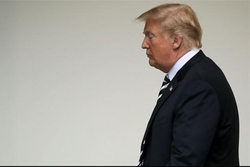 The United States’ annual defense budget, the National Defense Authorization Act (NDAA) came in at $738 billion for 2020, up from last year a sweet $22 billion.
The United States’ annual defense budget, the National Defense Authorization Act (NDAA) came in at $738 billion for 2020, up from last year a sweet $22 billion. RNA - This year the NDAA came with a few extra stocking-stuffers for the warmongers and profiteers. It bequeathed the world an upgraded possibility of nuclear war and guaranteed the universe a future of bellicosity beyond the confines of the planet.
It also accelerates the growing nuclear arms race with Russia. It fully funds almost every element of the Trump administration’s trillion-dollar plan to replace the entire US nuclear arsenal with new, more deadly weapons. Most immediately, it will allow the Trump administration to quickly deploy the new W76-2 nuclear warhead – a lower yield weapon specifically intended to be more useable in a nuclear conflict. Weapons such as this one make nuclear war more likely and do nothing to enhance our security.
Nor is that all. Trump's NDAA also fired bullets at a slew of countries including not only Iran, Russia and China but also traditional allies such as Germany and Turkey. Apart from negative rhetoric on issues related to China's Taiwan, Hong Kong and Xinjiang, the act lists Syria, Turkey, and most controversially, the Nord Stream 2 pipeline, as targets of sanctions.
Originally designed to transport natural gas directly from Russia to Germany, the pipeline is seen by Berlin as essential for its energy security. US punitive measures on companies involved in the project will undeniably exert tremendously negative effects on ties between the two allies. Immediately after the NDAA's passage, German Finance Minister Olaf Scholz lashed out at it as "serious interference in Germany and Europe's internal affairs and our own sovereignty."
Washington justified sanctions on the Nord Stream 2 pipeline as protection of Ukraine's interests and prevention of Russia's "undue leverage over Europe." Admittedly, the pipeline, if bypassing Ukraine, would mean huge financial losses for the country. But the Moscow-Kiev agreement clinched this month has ensured Ukraine's transit status in the project. "Hard to understand" is how Ulrike Demmer, a spokesperson for German Chancellor Angela Merkel, responded to Washington's Ukraine concerns.
Given this, the bogus fear of Germany becoming a "captive" of Russia sounds more like the real motive for the sanctions. In the era of global integration, systematic differences should be no longer a determinant in a country's foreign policy. However, American politicians are still obstinate in Cold War zealotry and its hostility against the socialist camp. From their perspective, a Western country's friendly ties with Iran, China or Russia are a result of its succumbing to economic interests.
Such a mentality is absurd. For any sovereign state in the 21st century, national interest is a top priority in their handling of foreign relations. In the Nord Stream 2 case, Germany has its own commercial and security considerations that should be independent of US interference. In Iran’s case, the EU countries want to save the nuclear deal and resume normal trade ties but to no avail, because of Washington's strong opposition. Also in China’s and Russia’s cases the same argument could be made which so far have gone nowhere.
Since Trump took office under his America First doctrine, the White House has been acting in self-contradictory fashion in foreign policy. On the one hand, it is pursuing to Make America Great Again at the cost of the interests of its allies. But on the other, it cannot accept its allies walking closer to the opposite side and is adept at using the "alliance" to pressure them into a unified stance with the United States.
According to Fars News Agency, take Germany as an example. Several times Trump has launched verbal attacks on Berlin for its trade surplus and failure to shoulder more defense spending. In blaming Germany, the US is prioritizing its national interests over those of its allies. But in the meantime, the US cannot accept Merkel's pursuit to Make Germany Great Again, which the US believes is a betrayal of the alliance.
As is, Washington sacrifices allies' interests for self-gain, but has been playing the alliance card to interfere in allies' domestic affairs as well. It has relentlessly pressured Berlin to ban China's telecommunications giant Huawei from the country's networks and to give up energy cooperation with Russia by imposing sanctions on the Nord Stream 2 pipeline. Washington is blatantly bullying its allies to walk away from Iran trade as well by failing to meet their end of the bargain under the 2015 nuclear deal, known as the Joint Comprehensive Plan of Action.
Whatever this is, such unilateral and selfish moves must be harshly denounced and resisted by the international civil society. Having habituated to its hegemonic status in the world, the US has been acting capriciously toward friends and foes alike under a capricious president. Trump's will to Make America Great Again is to make the world miserable again just like after the Second World War. If the US insists on taking advantage of its alliance to thwart Western countries' will to grow, it will only isolate the US internationally in the era of multilateralism.
847/940